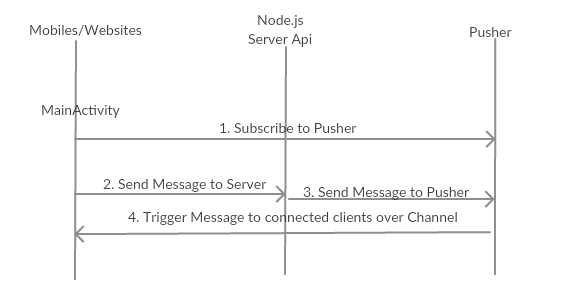Objective: Build chat room app where anyone having the android app can send and receive message anonymously using pusher.
Pre-requisites: Basic knowledge of android and nodejs.
Android and Server code for download at – https://github.com/AmitKondhalkar/anonymous-chat-app-pusher
What is Pusher? Pusher is a real time hosted service and provides bi-directional communication using server and client sdk. It is event-based, simple to understand, easy to integrate and scalable.
Pusher terminology: Pusher works on publish–subscribe messaging pattern. Sender publishes message using Pusher on particular channel and all the receivers subscribed to the channel and event gets the message.
Channel – Channels are a fundamental concept in Pusher. Each application has a number of channels, and each client can choose which channels it subscribes to.
Events – Events are used to classify messages on channel.
The Plan (Activity Diagram):

Pusher Dashboard:
Login to pusher dashboard and make a note of your app_id, app_key and app_secret.
The Code – HTTP Server using Node.js
On server side, we will use node.js pusher sdk to connect to pusher and trigger messages to specified channel.
- Create server starter code using Node and Express generator. https://expressjs.com/en/starter/generator.html
- Install pusher sdk
npm install pusher
- Connect to pusher and trigger message over channel.
var Pusher = require('pusher');
var PUSHER_PUBLIC_CHANNEL = "public-chat-message";
var PUSHER_EVENT_CHAT_MESSAGE = "event-chat-message";
var pusher = new Pusher({
appId: '278754',
key: 'f5f06119dc9c4c5c2bcb',
secret: '2617f6e308150321146f',
encrypted: true
});
- Trigger message using pusher as
pusher.trigger( PUSHER_PUBLIC_CHANNEL, PUSHER_EVENT_CHAT_MESSAGE, eventData );
- Run the http server.
The Code – Android App
- Add permission for Internet in AndroidManifest.xml
- Include pusher sdk to application’s build.gradle file:
dependencies {
//for http calls
compile 'com.loopj.android:android-async-http:1.4.9'
//pusher client sdk
compile 'com.pusher:pusher-java-client:1.4.0'
}
- Subscribe to channel/ bind event code
Pusher pusher = new Pusher(PUSHER_APP_KEY);
Channel channel = pusher.subscribe(PUSHER_PUBLIC_CHANNEL);
channel.bind(PUSHER_EVENT_CHAT_MESSAGE, new SubscriptionEventListener() {
@Override
public void onEvent(String channelName, String eventName, final String data) {
runOnUiThread(new Runnable() {
@Override
public void run() {
Gson gson = new Gson();
Message message = gson.fromJson(data, Message.class);
messageAdapter.add(message);
// have the ListView scroll down to the new message
messagesView.smoothScrollToPosition(messageAdapter.getCount() - 1);
}
});
}
});
pusher.connect();
- Send message from Main Activity to HTTP server on the click of send message button. (Refer publishToPublicChannel() method)
- Run the Android app on 2 or more simulators or mobile devices, and start chat.
- Note: You can track the messages sent/received on “Debug Console” of pusher dashboard.
References:
- Real Time Web Technologies – https://www.leggetter.co.uk/real-time-web-technologies-guide/
- Pusher Android Quick Start – https://pusher.com/docs/android_quick_start
Contact: Amit.Kondhalkar@talentica.com
I personally prefer https://deepstreamhub.com/ It is faster, has more features and based on open source, that means I always maintain full ownership of my data
LikeLike